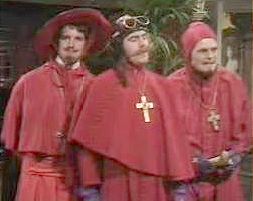When 10 backpacks loaded with dynamite exploded on Madrid commuter trains a year ago, shellshocked Spaniards looked east to place blame: Their country's troop presence in U.S.-occupied Iraq.
But on the anniversary of the March 11 massacre, which killed 191 people and wounded more than 1,500, fingers point closer at home -- at Spain's failure to monitor Muslim militants who had operated freely here for more than a decade. Since the attack, new terror plots have emerged, including one to destroy a courthouse that's the hub for Spain's probes of Islamic terror cases, and investigations elsewhere in Europe found links to Spain.
Chilling conclusion No. 2: Spain was not just a soft, one-time target for militants who said they had acted on al Qaeda's behalf to avenge Spain's presence in Iraq. One investigator outside the government calls Spain a "crossroads" for Muslim extremists in Europe. After waves of arrests and a quadrupling of investigators probing Muslim extremists, "Spain is safer now, but the threat level has not gone down for Spain or the European Union in general," government counter-terrorism chief Fernando Reinares told The Associated Press. He estimated Spain today is home to "a few hundred" Muslims indoctrinated in radical Islam and ready to be recruited for terrorism.
Reinares said the Madrid bombers had plotted to follow up the massacre with suicide bombings, which he said shows their goal was not really to punish the pro-U.S. government then in power. "What March 11 shows, and especially what came afterward, is that Spain was, is and will stay on the target list for Islamic terrorists," adds Jesus Nunez Villaverde, a security analyst specializing in the Arab world and president of a Madrid think tank called the Institute of Studies on Conflicts and Humanitarian Action.
He and Reinares said the main motive of the attack was revenge for Spain's arrest of dozens of al Qaeda suspects after the September 11, 2001, attacks in the United States -- including three charged with actually helping prepare them -- ending Spain's traditional status as a haven or transit point for Muslim militants. Twenty-four suspects arrested in those raids face trial in Madrid, probably next month.
Spain's porous southern edge is a short ferry ride from Morocco, home to most of the jailed suspects in the Madrid attack, and from Algeria, the native country of Allekema Lamari, a suspected ringleader of the attackers. On a clear day in southern Spain, looking across the choppy waters of the Strait of Gibraltar, Morocco is so close you can see it.
Since the late 1960s, successive Spanish governments have battled the armed Basque group ETA, which has used car bombs and shootings to try to force creation of an independent Basque homeland in northern Spain. The United States, the European Union and Spain classify ETA as a terrorist organization. So the Socialist administration voted into power three days after the March 11 attack inherited a counter-terrorism system geared toward fighting that threat, with police woefully unequipped to tackle illusive, high-tech savvy al Qaeda cells, Reinares said. For instance, in some cases transcripts of wiretapped Arabic telephone conversations among suspects were thrown away for lack of translators, officials say.
The pioneer in tackling Muslim extremists in Spain was Judge Baltasar Garzon, who began a probe in 1996 and eventually broke up the Spain-based cell accused of using this country as a staging ground for Sept. 11. But even afterward, Spain was so unaccustomed to this new kind of menace that it was like a wrestling with a cloud. "We are talking about very limited human and material resources," Reinares said. From the early 1990s until those arrests by Garzon in November 2001, Reinares said, "Spain was a place where individuals linked to al Qaeda operated with ease."
In a security overhaul, the government has moved to boost intelligence gathering and sharing of information, tightened controls on explosives -- high-grade dynamite used on March 11 was stolen from a loosely guarded Spanish mine -- and dispersed Muslim militant suspects among various jails to keep them from plotting behind bars, Reinares said. He said he was heartened that Spaniards have not shown any significant backlash against their estimated million-strong Muslim community, nor have police engaged in Abu Ghraib-style abuse of jailed March 11 suspects.
Mansur Escudero, a Spanish Muslim leader, agreed. He said there was has been virtually no violence against Muslims, with most anti-Islamic sentiment surfacing among political conservatives and ultra-Catholics speaking out in the media and on the Internet. "The Spanish people have understood perfectly that these individuals are making an illegitimate use of Islam," Escudero said of the March 11 cell.
Last year alone, Spain arrested 131 Muslim extremist suspects, and only about half were connected to the Madrid bombings. More than 40 were connected to a plot detected in October to blow up the National Court and assassinate judges like Garzon. A total of 22 are in jail over the train attack, and another 52 detainees were released but are still considered suspects. As many as eight are international fugitives. No formal indictments have been issued and a trial is probably months away.
Seven suspected ringleaders -- including the Algerian Allekema Lamari -- blew themselves up April 3 in an apartment outside Madrid as special forces who traced them through cell-phone traffic moved in to arrest them. These were the ones likely to stage suicide attacks in the months after the massacre, Reinares said.
The government has not publicly named a lone mastermind. Reinares said officials have "three or four" suspects in mind who may have linked the largely homegrown cell of North African immigrants with al Qaeda's decision-making core. Reinares did not identify them. But they are believed to include Mustafa Setmariam Nasar, a Syrian fugitive who played a key role in setting up an al-Qaeda structure in Spain and was indicted by Garzon over September 11. Late last year, the United States offered U.S.$5 million (â¬3.75 million) for information leading to his arrest. Another is fugitive Moroccan Amer Azizi, believed to be Setmariam Nasar's lieutenant.
Setmariam Nasar is now believed to be in Iraq fighting alongside Jordan-born terrorist chief Abu Musab al-Zarqawi, said Jean-Charles Brisard, a French private investigator working for lawyers representing September 11 victims in the United States.
Reinares said Spain is no more a hotbed for Muslim extremists than other European countries such as Britain, France or Italy. However, Brisard said that even after the arrests prompted by March 11 attack, the al Qaeda structure in Spain proved to be more important than any other in Europe in terms of collaboration with other cells. He called Spain a "crossroads" for Islamic radicals. "We've seen that in every case, all over Europe. People were always in contact with Spanish al-Qaida members," said Brisard, who works with police across Europe. "It is not the case with other cells." |



 Muslim clerics in Spain issued what they called the world's first fatwa, or Islamic edict, against Osama bin Laden on Thursday, the first anniversary of the Madrid train bombings, calling him an apostate and urging others of their faith to denounce the al-Qaida leader.
Muslim clerics in Spain issued what they called the world's first fatwa, or Islamic edict, against Osama bin Laden on Thursday, the first anniversary of the Madrid train bombings, calling him an apostate and urging others of their faith to denounce the al-Qaida leader.